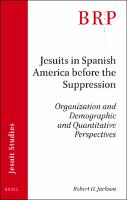Jesuits in Spanish America before the Suppression
Organization and Demographic and Quantitative Perspectives
Abstract
From the late sixteenth century until their expulsion in 1767, members of the Society of Jesus played an important role in the urban life of Spanish America and as administrators of frontier missions. This study examines the organization of the Society of Jesus in Spanish America in large provinces, as well as the different urban institutions such as colegios and frontier missions. It outlines the spiritual and educational activities in cities. The Jesuits supported the royal initiative to evangelize indigenous populations on the frontiers, but the outcomes that did not always conform to expectations. One reason for this was the effect of diseases such as smallpox on the indigenous populations. Finally, it examines the 1767 expulsion of the Jesuits from Spanish territories. Some died before leaving the Americas or at sea. The majority reached Spain and were later shipped to exile in the Papal States. Readership: All interested in the history of colonial Spanish America, the role of the Catholic church in colonial Spanish America, and frontier missions. Anyone interested in historical demography. Keywords: Society of Jesus, education, Misión Popular, colegios, frontier missions, Guaraní, Sonora-Sinaloa, Chaco, Baja California, expulsion.
Keywords
History of the AmericasDOI
10.1163/9789004460348ISBN
9789004460348, 9789004460331, 9789004460348Publisher
BrillPublisher website
https://brill.com/Publication date and place
2021Imprint
BRILLSeries
Brill Research Perspectives in Jesuit Studies,Classification
History of the Americas


 Download
Download Web Shop
Web Shop